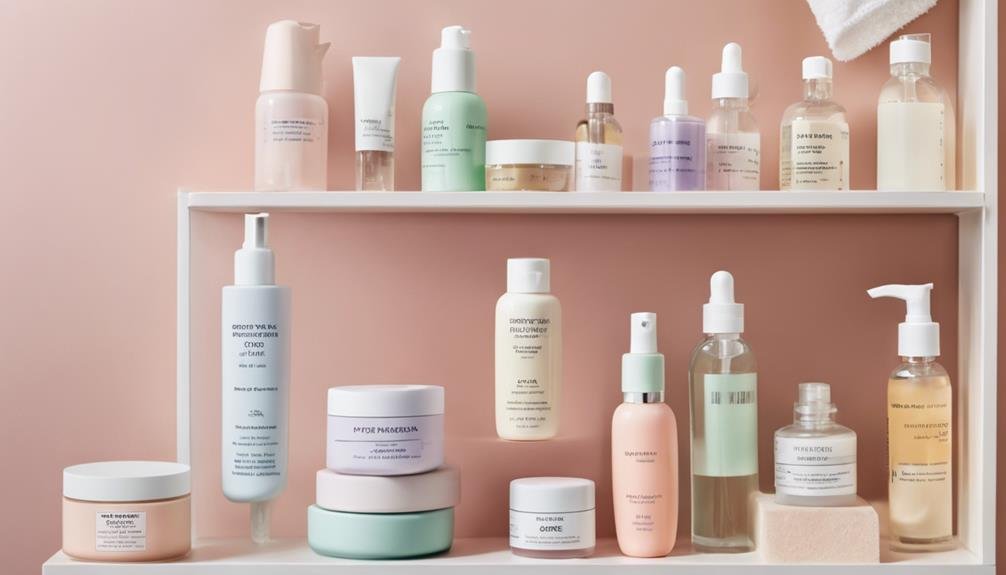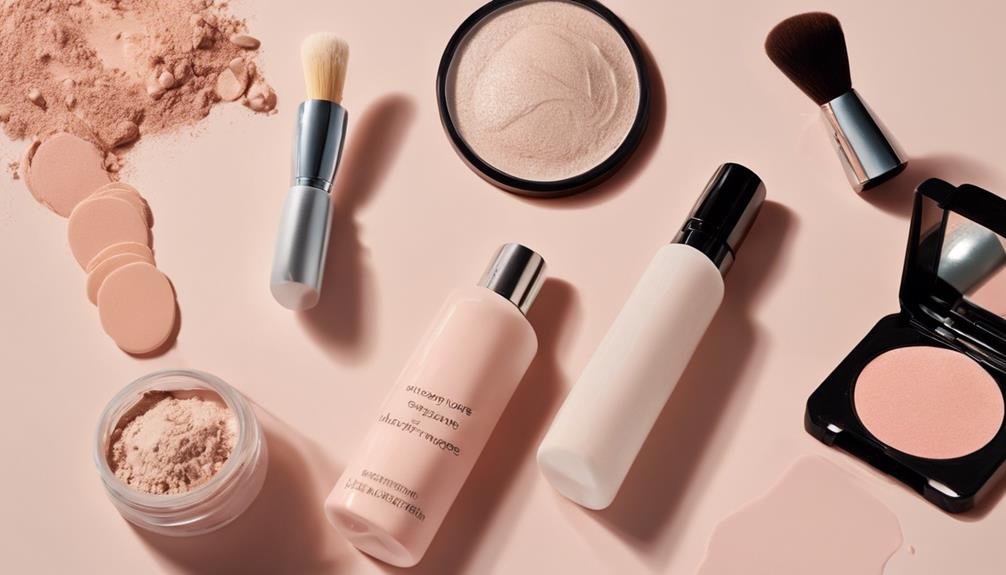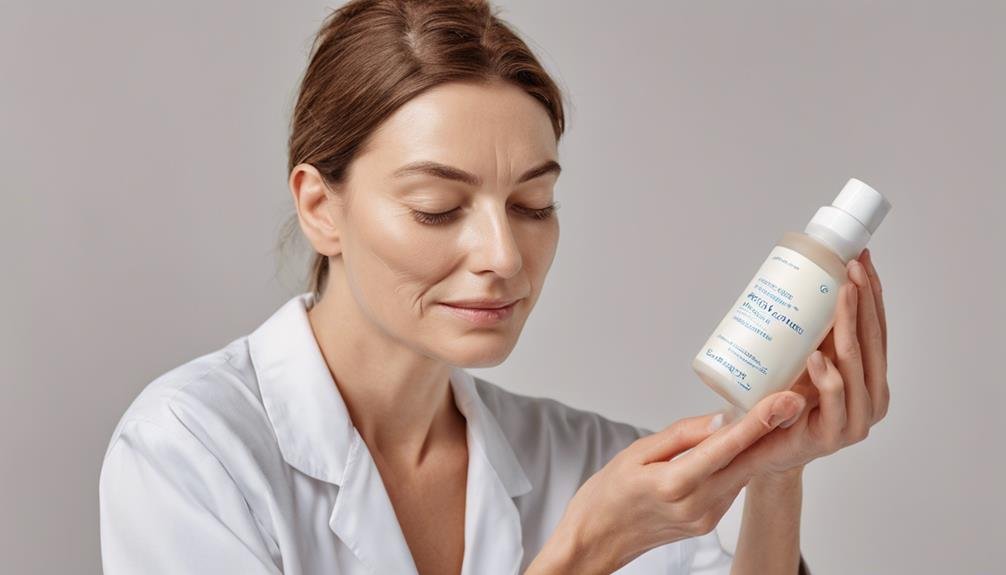When it comes to caring for sensitive skin, navigating the vast world of skincare can be daunting. Understanding how to cater to your skin's unique needs is crucial for maintaining a healthy complexion. From gentle cleansing to dermatologist recommendations, there are essential tips and tricks that can make a world of difference. By incorporating the right products and practices, you can create a skincare routine that works harmoniously with your sensitive skin. But what are some of the must-know secrets that could transform your skincare game?
Key Takeaways
- Use fragrance-free, gentle cleansers with soothing ingredients like aloe vera.
- Opt for hydrating moisturizers with ingredients like hyaluronic acid and ceramides.
- Choose fragrance-free and hypoallergenic skincare products to reduce irritation.
- Patch test new products to identify allergies and prevent skin irritation.
- Protect sensitive skin with broad-spectrum sunscreens and calming ingredients like chamomile.
Gentle Cleansing
When it comes to caring for sensitive skin, gentle cleansing is paramount. Sensitive skin requires special attention to prevent irritation and maintain a healthy complexion. Opt for mild, fragrance-free cleansers that are specifically formulated for sensitive skin. Look for ingredients like aloe vera, chamomile, or green tea, which have soothing properties and are less likely to cause reactions. Avoid harsh exfoliants or cleansers with strong fragrances, as these can aggravate sensitive skin.
When cleansing your face, use lukewarm water instead of hot water, as hot water can strip the skin of its natural oils and lead to dryness and irritation. Gently massage the cleanser onto your skin using circular motions, then rinse thoroughly with water.
Pat your skin dry with a soft towel, rather than rubbing, to avoid causing friction and irritation.
Hydrating Moisturizers
To effectively care for sensitive skin, selecting the right hydrating moisturizer is crucial. When choosing a moisturizer for sensitive skin, opt for products that are free of common irritants like fragrances, alcohol, and harsh chemicals. Look for moisturizers with soothing ingredients such as hyaluronic acid, glycerin, ceramides, and niacinamide, which can help hydrate and strengthen the skin's barrier without causing irritation.
Hydrating moisturizers play a vital role in maintaining the skin's moisture balance, preventing dryness, and reducing sensitivity. These products provide a protective barrier that locks in moisture and shields the skin from external aggressors.
When applying a hydrating moisturizer, gently massage it into your skin using upward motions to promote better absorption and circulation.
For sensitive skin, it's essential to choose a moisturizer specifically formulated for your skin type to avoid potential flare-ups and reactions. Always perform a patch test before incorporating a new product into your skincare routine to ensure it's well-tolerated by your skin.
Fragrance-Free Products
For individuals with sensitive skin, opting for fragrance-free products can be a wise choice to prevent potential irritation and reactions. Fragrances, even those labeled as natural, can contain a mix of chemicals that may trigger adverse skin responses in sensitive individuals. When selecting skincare products, consider the following:
- Reduced Irritation: Fragrance-free products are less likely to cause irritation or exacerbate existing skin conditions.
- Gentle Formulas: These products often have milder formulations that are suitable for sensitive skin types.
- Less Risk of Allergies: Fragrance-free options reduce the risk of allergic reactions, making them a safer choice for sensitive skin.
- Improved Skin Barrier: By avoiding potential irritants found in fragrances, you can help maintain a healthier skin barrier.
- Compatibility with Other Products: Fragrance-free products are versatile and less likely to clash with other skincare items in your routine.
Choosing fragrance-free skincare can significantly benefit individuals with sensitive skin by minimizing the risk of adverse reactions and promoting healthier skin.
Hypoallergenic Formulas
Opting for skincare products formulated with hypoallergenic ingredients can be beneficial for individuals with sensitive skin. Hypoallergenic formulas are designed to minimize the risk of allergic reactions, making them ideal for those with easily irritated skin. These products are free from common allergens and harsh chemicals, reducing the chances of redness, itching, or inflammation.
To help you navigate the world of hypoallergenic skincare, here is a handy table outlining key ingredients to look for and avoid:
| Ingredients to Look For | Ingredients to Avoid |
|---|---|
| Aloe Vera | Fragrance |
| Oat Extract | Parabens |
| Hyaluronic Acid | Sulfates |
| Chamomile | Alcohol |
Importance of Patch Testing
When considering a new skincare product, conducting a patch test is a crucial step, especially for individuals with sensitive skin. Patch testing helps you determine if a product will cause adverse reactions before applying it to your face or body. Here are five reasons why patch testing is essential for sensitive skin:
- Identifies Allergies: Patch testing reveals if you're allergic to any ingredients in the product.
- Prevents Irritation: It helps prevent skin irritation, redness, itchiness, or breakouts that sensitive skin may experience.
- Saves Time and Money: By patch testing, you can avoid purchasing full-size products that mightn't work for your skin.
- Customizes Skincare Routine: Allows you to tailor your skincare routine based on how your skin reacts to different products.
- Promotes Skin Health: By avoiding potential irritants, you maintain the health and balance of your sensitive skin.
Sun Protection Essentials
Sun protection is a fundamental aspect of skincare for individuals with sensitive skin. Sensitive skin is more prone to sun damage, making it crucial to incorporate adequate sun protection in your daily routine. When choosing sun protection products, look for those labeled "broad-spectrum" to ensure protection against both UVA and UVB rays. Opt for mineral-based sunscreens with ingredients like zinc oxide or titanium dioxide, as they are less likely to cause irritation. Remember to reapply sunscreen every two hours, especially if you are outdoors.
Sun Protection Essentials Table
| Product Type | SPF Level | Key Features |
|---|---|---|
| Mineral Sunscreen | SPF 30+ | Gentle on sensitive skin, provides physical barrier against UV rays |
| Lightweight Gel | SPF 50 | Non-greasy formula, ideal for daily wear under makeup |
| Tinted Moisturizer | SPF 15 | Hydrating, offers light coverage while protecting from the sun |
Ensuring you have these sun protection essentials will help safeguard your sensitive skin from the harmful effects of the sun.
Calming Ingredients
Sensitive skin requires gentle care and attention, especially when it comes to choosing skincare products. When looking for products with calming ingredients, opt for those that are known to soothe and nourish your delicate skin. Here are some key ingredients to keep in mind:
- Aloe Vera: Known for its anti-inflammatory properties, aloe vera can help calm redness and irritation.
- Oat Extract: Oat extract contains compounds that can help alleviate itching and dryness, making it ideal for sensitive skin.
- Chamomile: Chamomile is a gentle ingredient that can help soothe sensitive skin and reduce inflammation.
- Green Tea: Rich in antioxidants, green tea can help protect the skin from environmental stressors and reduce redness.
- Cucumber: With its cooling properties, cucumber can help hydrate and calm sensitive skin, especially after sun exposure or irritation.
Choosing products with these calming ingredients can help provide relief and care for your sensitive skin.
Avoiding Harsh Exfoliants
Have you ever wondered about the impact of harsh exfoliants on your skin's health and sensitivity? When it comes to sensitive skin, avoiding harsh exfoliants is crucial to prevent irritation and inflammation. Harsh exfoliants can strip away the skin's natural oils, disrupt its barrier function, and lead to redness and discomfort.
Here is a table to illustrate the potential effects of harsh exfoliants on sensitive skin:
| Harsh Exfoliants Effects | Description |
|---|---|
| Irritation | Can cause redness and itchiness |
| Inflammation | May result in swelling and discomfort |
| Dryness | Stripping natural oils can lead to dry, flaky skin |
| Sensitivity | Increases skin's sensitivity to other products and environmental factors |
Makeup for Sensitive Skin
Considering the delicate nature of your skin, it's vital to be mindful of the makeup products you choose. When dealing with sensitive skin, opt for makeup that's gentle and non-irritating. Here are some tips to help you navigate the world of makeup for sensitive skin:
- Look for Hypoallergenic Formulas: These are less likely to cause allergic reactions.
- Choose Fragrance-Free Products: Fragrances can be a common irritant for sensitive skin.
- Avoid Harsh Chemicals: Opt for products that are free from ingredients like parabens, sulfates, and phthalates.
- Opt for Mineral Makeup: Mineral makeup is often gentle and less likely to clog pores.
- Check for Non-Comedogenic Labels: This means the product is less likely to cause breakouts.
Nighttime Skincare Routine
When establishing a nighttime skincare routine, prioritizing gentle and effective products is key to promoting skin health and rejuvenation.
To begin, start by cleansing your face with a mild, fragrance-free cleanser to remove makeup, dirt, and impurities accumulated throughout the day. Follow this with a hydrating and soothing toner to balance your skin's pH levels and prepare it for the next steps.
Consider incorporating a nourishing serum containing ingredients like hyaluronic acid or niacinamide to target specific skin concerns such as hydration or redness.
Next, apply a gentle moisturizer to lock in moisture and provide overnight hydration. For those with sensitive skin, choosing products labeled as non-comedogenic and hypoallergenic can help prevent irritation and breakouts.
Lastly, don't forget to apply a gentle eye cream to hydrate the delicate skin around your eyes. This simple yet effective nighttime routine can help soothe and nourish sensitive skin while promoting overall skin health.
Dermatologist Recommendations
To further enhance your nighttime skincare routine and address any specific skin concerns, seeking guidance from dermatologists can provide valuable insights and personalized recommendations. Dermatologists recommend the following for sensitive skin care:
- Gentle Cleanser: Opt for a fragrance-free, non-comedogenic cleanser to avoid irritation.
- Moisturizer with Ceramides: Look for a moisturizer containing ceramides to help restore the skin barrier.
- Hypoallergenic Products: Choose products labeled hypoallergenic to minimize the risk of allergic reactions.
- Sunscreen: Use a broad-spectrum sunscreen with SPF 30 or higher to protect your skin from UV damage.
- Patch Testing: Consider patch testing new products on a small area of skin to check for any adverse reactions before applying them to your face.
These recommendations can help you tailor your skincare routine to meet the unique needs of your sensitive skin, ensuring optimal results and minimal irritation.
Lifestyle Factors to Consider
Taking a holistic approach to skincare involves acknowledging the impact of lifestyle factors on your skin's health and sensitivity. Your daily habits can significantly influence how your skin looks and feels. Stress, lack of sleep, poor diet, and exposure to environmental aggressors like pollution and UV rays can exacerbate sensitivity.
Managing stress through mindfulness practices, ensuring you get enough restorative sleep, consuming a balanced diet rich in antioxidants, and protecting your skin from environmental damage with sunscreen are crucial steps in supporting sensitive skin.
Additionally, being mindful of the products you use, opting for gentle, fragrance-free formulations, and avoiding harsh ingredients can help prevent irritation and inflammation. Remember, what you do daily not only affects your overall well-being but also plays a vital role in maintaining your skin's health and resilience.
Frequently Asked Questions
Can Stress Worsen Sensitive Skin Conditions?
Yes, stress can exacerbate sensitive skin conditions. Hormonal changes triggered by stress can lead to inflammation, redness, and irritation. Implementing stress management techniques like mindfulness, exercise, and self-care can help mitigate these effects and improve skin health.
Is It Safe to Use Essential Oils on Sensitive Skin?
Wondering if essential oils are safe for your sensitive skin? Proceed with caution. While some may be gentle, others can trigger irritation. Patch test first and research suitable options to safeguard your skin's health.
How Can Weather Changes Affect Sensitive Skin?
Weather changes can trigger skin reactions for sensitive individuals. Cold, wind, or heat can exacerbate redness, dryness, or irritation. Keep skin hydrated with gentle moisturizers, use sunscreen, and protect with scarves or hats. Consult a dermatologist for personalized advice.
Can Food Allergies Trigger Skin Reactions?
Yes, food allergies can trigger skin reactions. Your body's immune response to certain foods can lead to hives, eczema, or swelling. It's crucial to identify and avoid trigger foods to manage skin reactions effectively.
Are There Specific Fabrics That Aggravate Sensitive Skin?
When it comes to sensitive skin, opting for soft, breathable fabrics like cotton can help prevent irritation. Avoid rough materials like wool or synthetics that may aggravate your skin. Remember, "an ounce of prevention is worth a pound of cure."
Conclusion
In conclusion, caring for sensitive skin requires gentle and soothing skincare products to maintain a healthy complexion. Did you know that approximately 60% of people report having sensitive skin? By prioritizing fragrance-free, hypoallergenic, and calming ingredients, individuals can effectively manage their skin's sensitivity. Remember to patch test new products, follow a consistent skincare routine, and consult with a dermatologist for personalized recommendations. Keep your skin happy and healthy with the right skincare choices.







